Working class, people of color face greatest challenges in caregiving
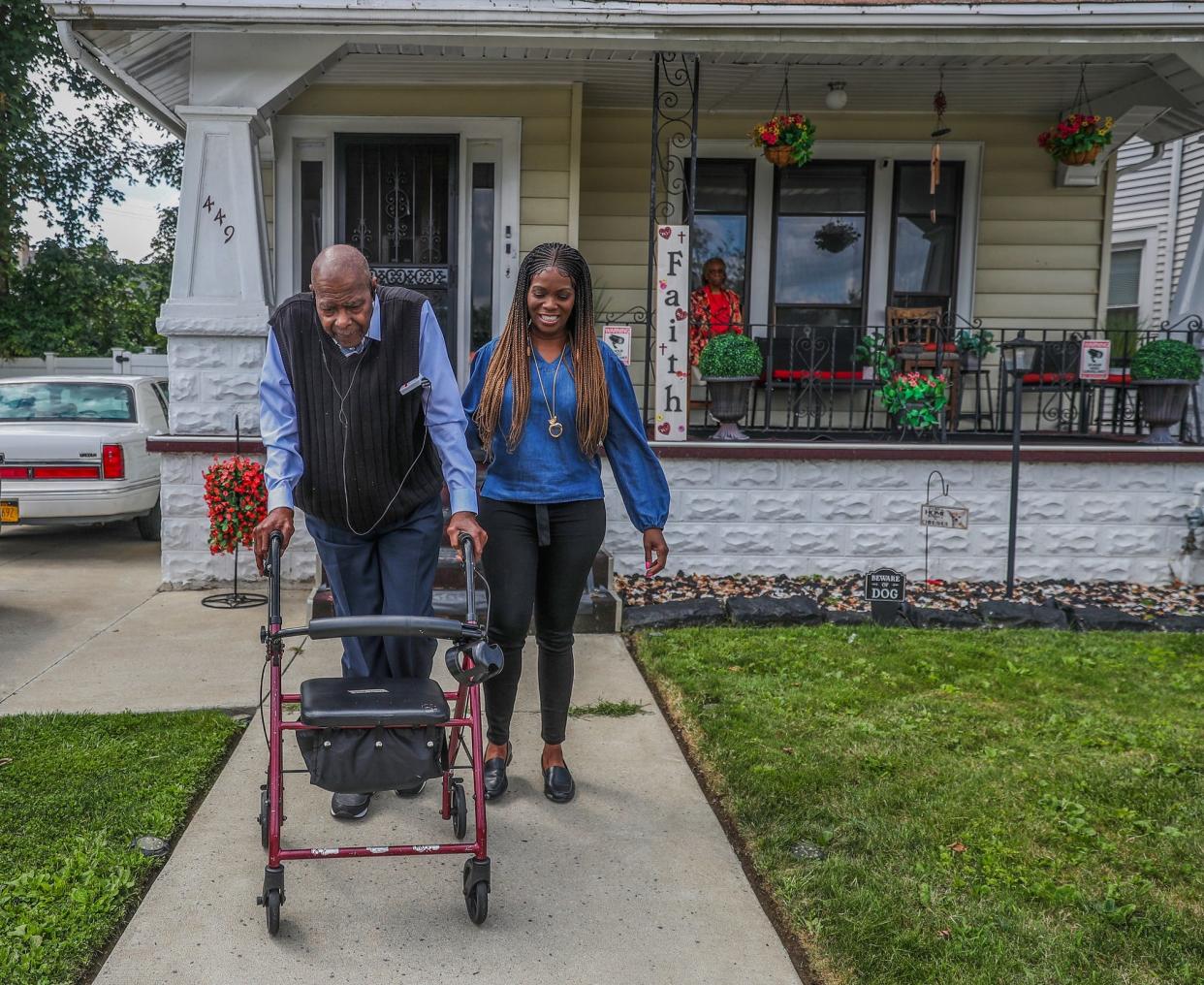
Myzette Howell was working as a flight attendant in Chicago when it became clear, even from a distance, that her parents were no longer equipped to live on their own in the family homestead in Buffalo.
Howell, in her mid-50s and single, took family leave in 2019 and moved back into her old bedroom to help the couple who brought her into this world.
For now, she is a full-time caregiver, a role that comes with no pay in service to two beloved housemates who move slowly and shoulder memory loss.
She often feels tired and isolated. She has exhausted her savings. She doesn’t know how long this job will last but wouldn’t trade it for the world, at least right now.
“It's a blessing, it's rewarding, but it is a struggle,” she said.
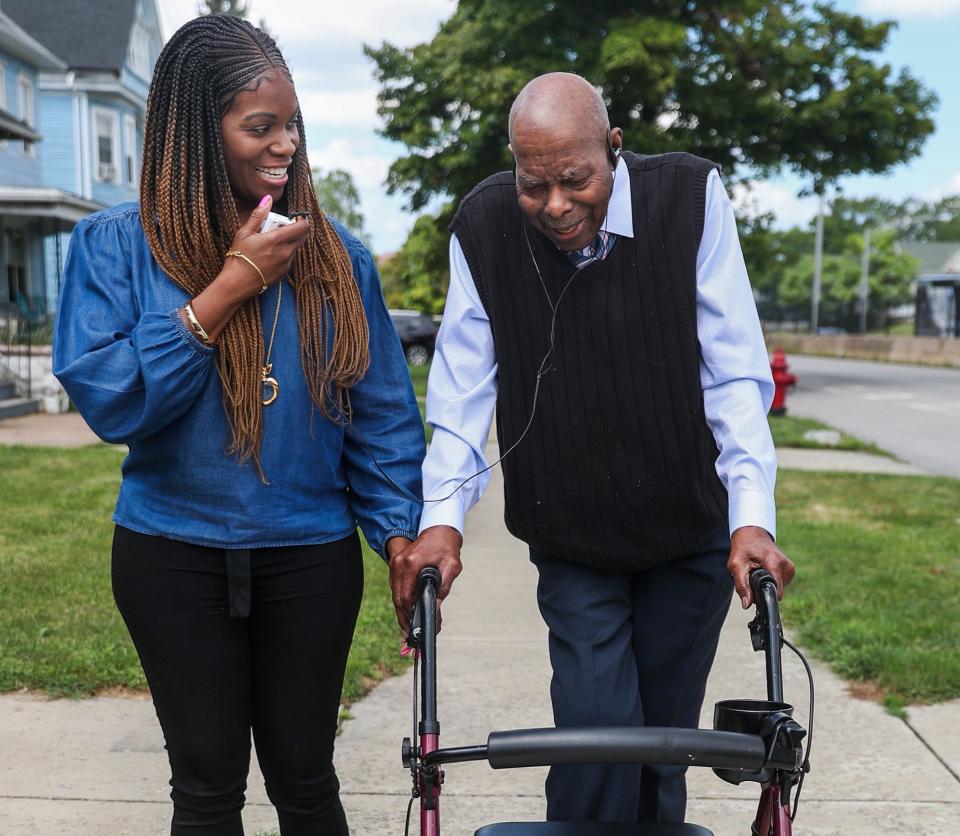
Like Howell, working-class caregivers of color and those of modest means who spend more than 20 hours a week providing care face the greatest challenges of all caregivers in Buffalo-Niagara, Detroit and Rochester, a recent survey shows.
Medicaid and Medicare may provide help for many who need care, but there is less support for caregivers, especially those like Howell. Because of this, they often face greater personal expenses when providing care and report a heavier health burden for themselves than those with more financial means, according to the survey, commissioned by the New York & Michigan Solutions Journalism Collaborative, of which the Democrat and Chronicle is a member.
Among its key findings:
• Caregivers most commonly tend to someone who is bedridden, has mobility issues or a chronic health condition.
• About 1 in 6 Western New Yorkers takes care of someone with dementia; 1 in 10, someone who suffered a stroke.
• More than half of caregivers pay out of pocket to help those in their care.
• Spending is higher for people of color, sandwich generation caregivers and those who spend more time each week providing care.
• More people report a mental health toll or physical and mental health toll compared with solely a physical toll.
“There are 40 million Americans who have some caregiving responsibilities, but we are so far behind in recognizing that from a policy perspective,” said Robert Blancato, national coordinator with the Elder Justice Coalition and statewide coordinator with We Stand with NY Seniors. “There is only one major federal program that helps family caregivers, the National Family Caregiver Support Program. It has $250 million for the whole country.”
The Glengariff Group, of Lansing, Michigan, last summer conducted the poll of 1,000 participants, half from Michigan and half from Western New York. All are unpaid caregivers tending to someone 65 or older. It was designed to document challenges caregivers face and create news coverage that explores ways to address those challenges.
Regional comparison
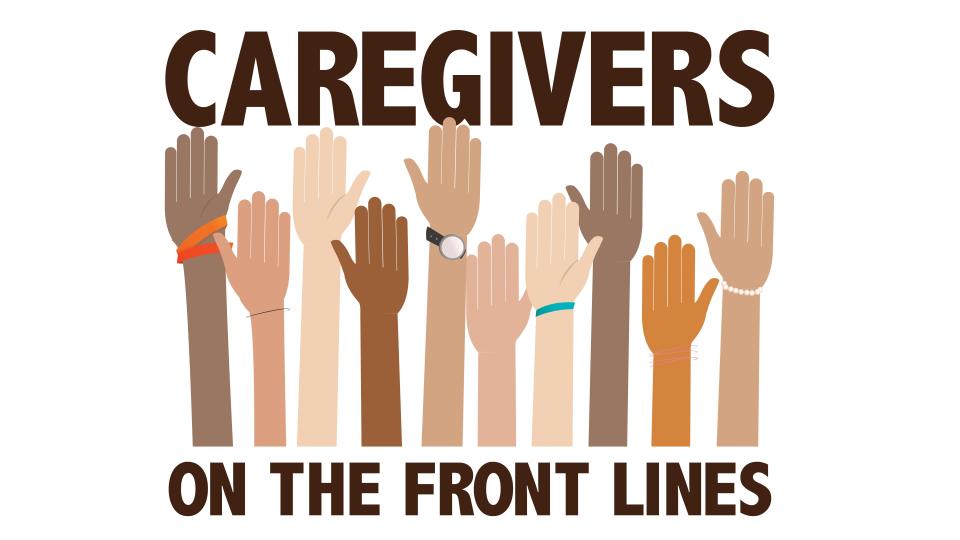
In both Metro Detroit and Western New York, caregiving can be a costly endeavor. AARP estimates that average caregivers spent more than $7,000 last year on various out-of-pocket costs.
Across the board, caregivers in both states are facing the same problems. In most categories, survey results are nearly identical. More than half of the caregivers who responded in both regions are older than 50. More than half are female. The majority care either for a parent, parent-in-law or friend.
Like Howell, many of those caregivers go unsupported. While the majority of caregivers rely on someone else to help them — family and friends, paid caregivers, or both — more than a quarter of all respondents in the Solutions Journalism survey say they do it alone; about a third of them do it for 21 hours or more every week, the equivalent of an extra job.
Care in Crisis: Caregivers are reaching a breaking point in Michigan
More:Exhale family caregiver initiative gathers partners to imagine solutions-driven programs
"It hits hardest to those who can stand the fewest hits," said Dana Lasenby, executive director and CEO of Oakland Community Health Network, an organization based in the Detroit suburbs that helps connect caregivers with resources, including respite care to give caregivers a break.
"A lot of times,” Lasenby said, “people are being cared for by other vulnerable people with limited resources and support."
The Michigan and upstate New York regions differ from each other as well. In Erie, Niagara and Monroe counties, a higher proportion of respondents reported graduating from college. In Metro Detroit, respondents were disproportionately people of color.
"It's really critical that we continue to recognize that caregivers are widely diverse," said Rita Choula, director of caregiving at the AARP Public Policy Institute. "Racially and ethnically, geographically, from their socioeconomic background, they're diverse. The result is that not every solution is for every caregiver."
Challenges mount
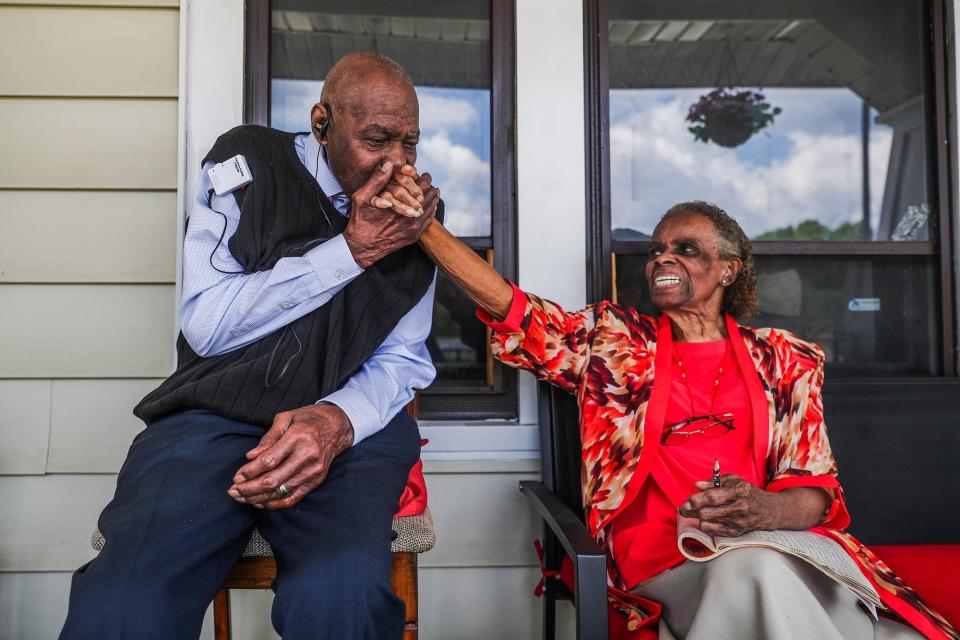
New York has the fourth-largest population in the U.S. of adults 65 and older, 16%, an age group expected to climb to 25% by the end of this decade, Blancato said.
The pandemic made things worse for most of the estimated 4.1 million caregivers in the Empire State who each year provide 2.7 billion hours of unpaid care, said Becky Preve, executive director of the Association on Aging in New York. At least at some point since 2020, 61% in that group worried about caring for a loved one and 70% reported at least one mental health symptom.
“We also know from the data during Covid-19 that 70% of individuals who were caregivers said they encountered some type of work-related difficulty due to being a care provider, whether that be rearranging their schedule or taking a leave of absence,” Preve said. “Ten percent left the workforce entirely.”
Howell, who has a bachelor’s degree in communications from SUNY Buffalo State, and her three siblings grew up in the house she now shares with her mother, Loretta, in her late 80s, a retired teacher and assistant principal, and father, Percy, in his early 90s, a former Golden Gloves boxer who worked for three decades at the GM Tonawanda plant before retiring in 1990.
The couple, married for nearly seven decades, spend almost all their time together watching television, working on word games and reminiscing. Between them, they have buried their parents and seven siblings at ages that fell at least 15 years shorter from where they find themselves now.
“They planned for everything else,” their daughter said. “This is the one thing they never saw coming.”
Percy Howell suffered a stroke several months ago and needs a hearing device to carry on conversations. His wife, still keen-eyed and engaging, continues to deliver compliments and commentaries, but quickly forgets them.
The couple – both diagnosed with Alzheimer’s disease in February 2019 after Howell moved home – have been among the many to weather loss in recent years.
It started with the death of a daughter, 57, to multiple sclerosis the month before the dementia diagnosis, and the passing of their only son, 63, from a stroke that April. Their other surviving daughter rarely visits since Myzette Howell returned to Buffalo.
Myzette Howell spent her savings to “elder-proof” the homestead and help meet family needs. She and her parents are grateful to live in a house with no mortgage and a sign that says "faith" out front.
Because of Social Security, Medicare and pensions, her parents can afford food, transportation, medication and other expenses, as well as the $1,200 a month it takes for them to spend three days a week at Lord of Life Adult Health Center in Depew. Bingo, trivia, painting, board games, chair yoga and regular meals are among the staples.
“We exercise and have no problems,” Percy Howell said, flashing a smile. “It’s fun for old people like me.”
Pressure and loneliness
Lord of Life also gives their daughter a chance to catch up on sleep, run errands and prepare for medical appointments and other activities on behalf of her parents, including for stops after health visits to feed the birds at Erie Basin Marina.
Still, it isn’t easy.
“I get about three hours of sleep every night,” said Myzette Howell, who needs to be on guard at night because her father, who uses a walker, sometimes wanders the house in the darkness. Her mother, much more mobile, uses furniture to help catch her balance. She has fallen three times this year.
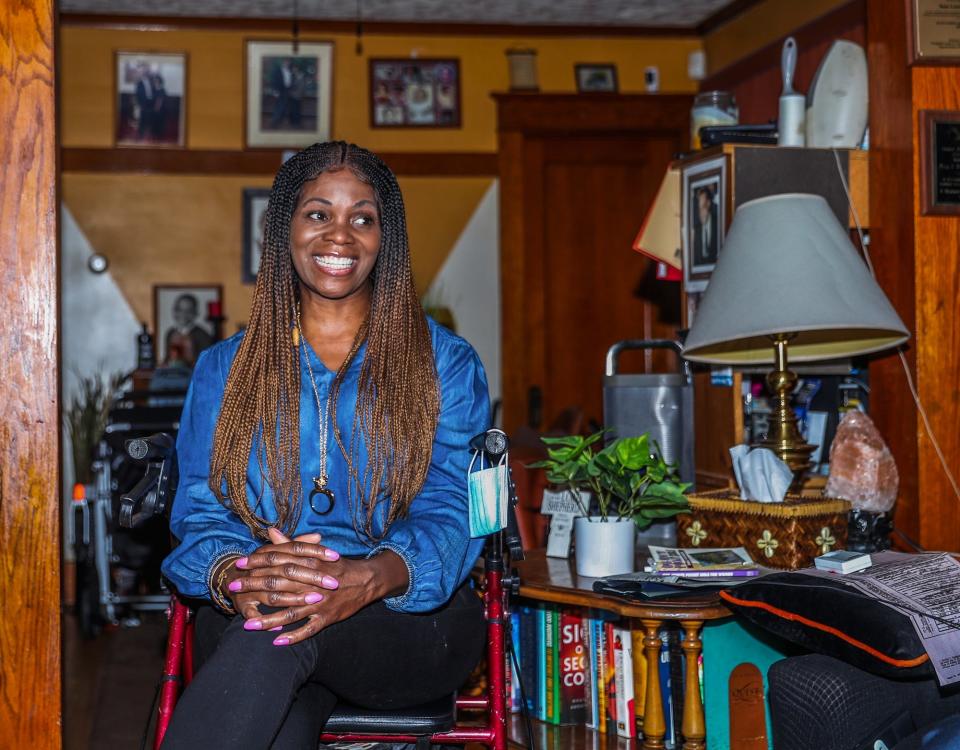
“I have gained 60 pounds in three years,” the youngest Howell said. “I used to get up every morning and run for 5 miles. I was eating healthy. I was getting on planes and running through terminals. Now I'm doing the same thing they're doing, but I'm not working out anymore. My social life is nonexistent because all of my friends are in Chicago. My activity has gone from 100 to zero.
“I have to find the entertainment for them,” she said, “and that can be hard when you're tired and you're stressed, and when everybody around you thinks you're so strong and can handle it. But that's not necessarily true for caregivers, because while you're caring for them, you kind of feel like, OK, so who's caring for me?”
Howell mourns that her parents – who for decades reveled in large social circles, travel and a bustling family life – now rarely get visits from grandkids, nieces, nephews, friends and fellow church members. She hates that she had to take away the car keys from her parents.
“I do try to give them quality time together and give them their independence as much as I can,” she said. “The conversations I overhear sometimes I just have to look up and giggle and go, ‘Well, they're in their own little world. Let them be in their happy place for a while...
"The fact that I've been away for 20 years, I've always known them as mom and dad," she said, "but I'm getting to know them as Percy and Loretta. I'm getting to know their likes, their dislikes, what makes them tick, what makes them laugh. And so our relationship has a whole different dynamic that I wasn't used to, that I didn't expect."
Her parents are grateful she has returned to that world, and that last year she bought a chihuahua named Myckee to add to the fun.
“Having Myzette here has made a big difference in our lives,” her mother said. “She's been a blessing, no question.”
Despite the challenges, when the daughter steps back and takes a moment, she sees the arrangement in much the same way.
“I was speaking to Mom the other night and she was kind of sad,” Myzette Howell said. “She's like, ‘I can't believe we're putting so much on you’ and ‘This has got to be such a burden.’ I said, ‘You and Dad are not a burden. You guys took care of me, this is just my way of paying it forward and paying you back for all you've done.’
“This is our assignment right now and that's all we can do, just live in the moment.”
***
This coverage is provided in affiliation with the New York & Michigan Solutions Journalism Collaborative, a partnership of news organizations and community organizations dedicated to rigorous and compelling reporting about successful responses to social problems. The group is supported by the Solutions Journalism Network.
The collaborative’s ongoing occasional series, Invisible Army: Caregivers on the Front Lines, focuses on potential solutions to challenges facing caregivers of older adults. Read related stories at nymisojo.com. The collaborative also has compiled a detailed Caregiving Resource Guide with links to online information about various issues of interest to caregivers.
Reporters Hayley Harding and Sarah Rahal from The Detroit News and Jack Rosenberry, data journalism coordinator with the New York & Michigan Solutions Journalism Collaborative, contributed to this story.
This article originally appeared on Rochester Democrat and Chronicle: Caregiving challenging for people of color, working class

